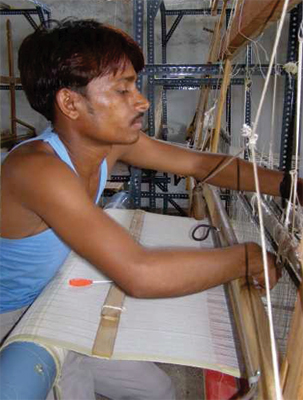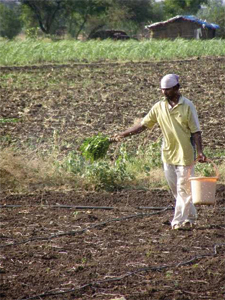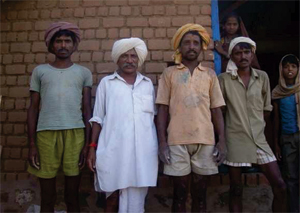Discovery of a singular trading company
During a field visit in the Malwa region, in western Madhya Pradesh, we stopped in a small paradise in the middle of cotton fields where BioRe India Ltd and its association are working to promote organic farming among the tribal communities. Some of these communities are led by activists of Ekta Parishad.
 BioRe India Limited procures and sells certified organic cotton. It supports local farmers in growing cotton following biodynamic farming principles. It works in partnership with farmers and customers to promote sustainability in the agriculture.
BioRe India Limited procures and sells certified organic cotton. It supports local farmers in growing cotton following biodynamic farming principles. It works in partnership with farmers and customers to promote sustainability in the agriculture.
Since 2003-2004, the BioRe’s activities have been socially developed through BioRe Association. Nowadays, they work with 700 to 800 villages and nearly 8000 farmers at different levels.
Hand Weaving Workshop
Eight months ago, two selected people from Kasrawat have followed a training on hand weaving. Then, they came back to the community, taught what they had learnt and now 17 persons are working in this workshop. Each weaver produces between 3 and 5 meters of organic cotton fabric per day.
How it works?
- Reception of the organic raw material (cotton)
- The women from the Self Help Groups in the villages make yarns from
the first cotton (Hand spinning) - Other women in the workshop wind the hand spun yarns in reels
- These reels are then warped to get bigger reels of 50 to 100 metres of yarn
- Process of setting up the warps on the looms
- Weaving on hand looms
- Organic hand spun fabric
Education
In most of those villages, they organise animation schools in different communities. In a Bhilala Adivasi community they built a school in 2007 where 37 children follow the classes in Hindi and English with books and bag schools provided by BioRe.
Moreover, in the office of Kasrawat, they opened a computer centre where every farmer can have access for classes.
 Health- Sanitation
Health- Sanitation
Five days a week, a mobile hospital visits the communities to respond to the health basic needs of the villagers. This mobile hospital is a huge converted bus with all the needed competent staff and materials.
They implemented sanitation programs in the villages too, with construction of toilets and hand pumps.
Organic Research
BioRe in collaboration with FiBL (Research Institute of Organic Agriculture – Germany, Switzerland, Austria) is making a research about the different methods of farming. They are comparing 4 kinds of working the land: Biodynamic (method of organic farming that has its basis on spiritual world view developed by the German anthroposoph Rodolf Steiner), Organic, Conventional, GMO. This research is running for 10 years.
Reduction of carbon emission
BioRe is implementing in the villages systems of Biogas (gas produced from cow dung and water, the waste of this process is then used as compost) and smokeless stoves (insertion in the stove of a long tube that ejects the smoke
out of the house).
BioRe – Ekta Aadivasi Pariyojana: an association that defends the same values.
In 2005-2006, a project of organic farming supported by BioRe and Ekta started with 118 farmers with a bio cotton area of 231 acres. The next year, the farmers were facing real difficult climate conditions (heavy rains) which have had bad consequences on the crops. In that time, BioRe and Ekta have stand the farmers providing the seeds for their food crops for the survival of the farmers that created a positive impact on the villagers who felt stronger than earlier.
 Nowadays, they are working with more than 400 farmers in 18 villages and the bio cotton area is 1040 acres. This project mainly focuses on 2 points: the land rights and the land development.
Nowadays, they are working with more than 400 farmers in 18 villages and the bio cotton area is 1040 acres. This project mainly focuses on 2 points: the land rights and the land development.
For the process of turning into organic agriculture, some of the farmers of different communities have been selected to follow the trainings to basically learn how to grow organic cultures and then teach to the others farmers in the village. They also assist to different workshops about land rights.
One of the tools used for the training is the Participatory Rural Appraisal (PRA). The PRA is a range of participatory approaches and methods that emphasize local knowledge and enable local people to conduct their own appraisal, analysis, and planning. It uses group animation and exercises to facilitate information sharing, analysis, and action among stakeholders. Although originally developed for use in rural areas, it can be employed successfully in a variety of settings, enabling development facilitators, government officials, and local people to work together to identify and address local development needs.
In these villages, the farmers learnt how to make compost and other organic fertilizers, which shrubs or plants are useful to be grown near the culture to move the insect pest away, how to turn the different cultures on the land not to exhaust the resources of the soil.
They also learnt all the positive effects of the organic agriculture, notably that despite the fact that the first year the yield is less, the quality of the land improves and the following years, the yield will be better in quantity and quality while spending less money for inputs. Moreover, the water is kept clean and the health of the villagers gets better. All these factors make the migration to bigger cities less important and give them strength to struggle to keep their land healthy and wealthy for a better future.
By Elodie – Ekta Parishad




